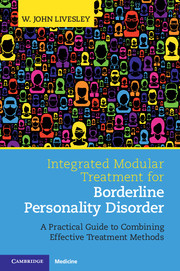 Integrated Modular Treatment for Borderline Personality Disorder
Integrated Modular Treatment for Borderline Personality Disorder Book contents
- Frontmatter
- Dedication
- Contents
- Preface
- Section 1 Introduction and Framework for Understanding Borderline Personality Disorder
- Section 2 Assessment and Treatment Planning
- Section 3 General Treatment Modules
- Introduction
- 7 General Treatment Module 1: Structure
- 8 General Treatment Module 2: Treatment Relationship
- 9 General Treatment Module 3: Consistency 101ment Module 3: Consistency
- 10 General Treatment Module 4: Validation
- 11 General Treatment Module 5: Self-Reflection
- 12 General Treatment Module 6: Motivation
- Section 4 Safety, Containment, and Engagement: The Initial Phase of Treatment
- Section 5 Improving Emotional Regulation and Modulation
- Section 6 Exploration and Change: Treating Interpersonal Problems
- Section 7 Constructing an Adaptive Sense of Self
- Section 8 Retrospect and Prospect
- References
- Index
11 - General Treatment Module 5: Self-Reflection
from Section 3 - General Treatment Modules
Published online by Cambridge University Press: 16 February 2017
- Frontmatter
- Dedication
- Contents
- Preface
- Section 1 Introduction and Framework for Understanding Borderline Personality Disorder
- Section 2 Assessment and Treatment Planning
- Section 3 General Treatment Modules
- Introduction
- 7 General Treatment Module 1: Structure
- 8 General Treatment Module 2: Treatment Relationship
- 9 General Treatment Module 3: Consistency 101ment Module 3: Consistency
- 10 General Treatment Module 4: Validation
- 11 General Treatment Module 5: Self-Reflection
- 12 General Treatment Module 6: Motivation
- Section 4 Safety, Containment, and Engagement: The Initial Phase of Treatment
- Section 5 Improving Emotional Regulation and Modulation
- Section 6 Exploration and Change: Treating Interpersonal Problems
- Section 7 Constructing an Adaptive Sense of Self
- Section 8 Retrospect and Prospect
- References
- Index
Summary
Therapists of most persuasions seek to deepen patients’ knowledge about themselves and their ability to reflect on this knowledge. Although the idea of “increasing self-knowledge” seems self-evident, we need to be clear about what is involved because patients often claim to be well aware of their problems. In a sense, this is often true: most patients do indeed have some awareness of their difficulties. However, the self-knowledge that matters is more than simple awareness: it is also recognition of significance of the problem coupled with emotional acceptance of that problem. Patients often recognize this distinction – they talk about knowing something but not really feeling it. But it is the feeling part that matters. As many theorists that noted, emotion is critical to understanding and changing experience and behaviour.
Most of us have experienced a sudden realization about ourselves that causes us to think about ourselves a little differently – as if we suddenly connect the dots even though we have always been aware of the dots. This happened with Anna who suddenly realized that her tendency to agree to even the most unreasonable demands made by her extended family caused her to feel used and exhausted. She noted: “I have always known I am like this but I thought it was the right thing to do. I hadn't realized how agreeing to do whatever people ask causes me to neglect my own family and makes me feel depressed and a loser.” This is the kind of self-knowledge we want to generate in therapy – the kind that catalyses change by changing how people think about themselves.
However, awareness and acceptance are not sufficient. Patients also need to reflect on their actions and experience if they are to change. The term “self-reflection” refers to the cognitive and metacognitive processes involved in reflecting on inner experience and understanding the mental states of self and others. Self-reflection is the capacity to think about, appraise, and evaluate one's mental processes and products. An important feature of human thinking is the reflexive loop built into the way we think: we not only are aware of our experience but are also able to think about this experience and our awareness of it.
- Type
- Chapter
- Information
- Integrated Modular Treatment for Borderline Personality DisorderA Practical Guide to Combining Effective Treatment Methods, pp. 116 - 122Publisher: Cambridge University PressPrint publication year: 2017


